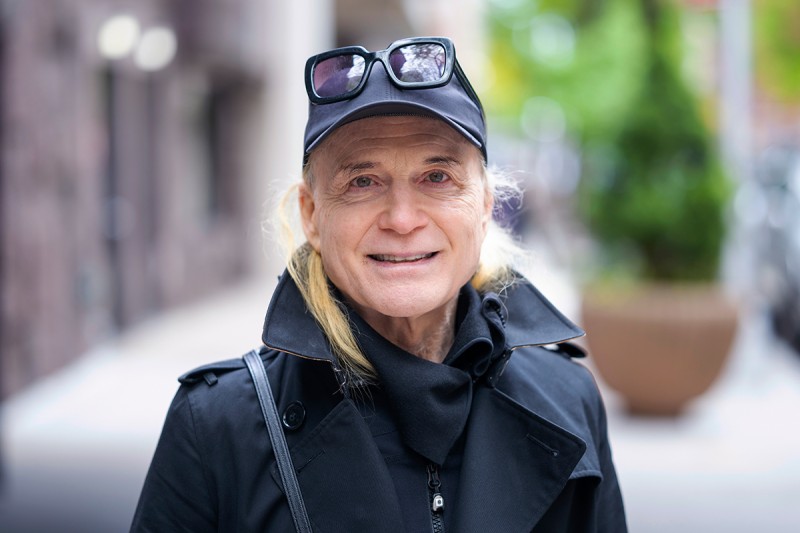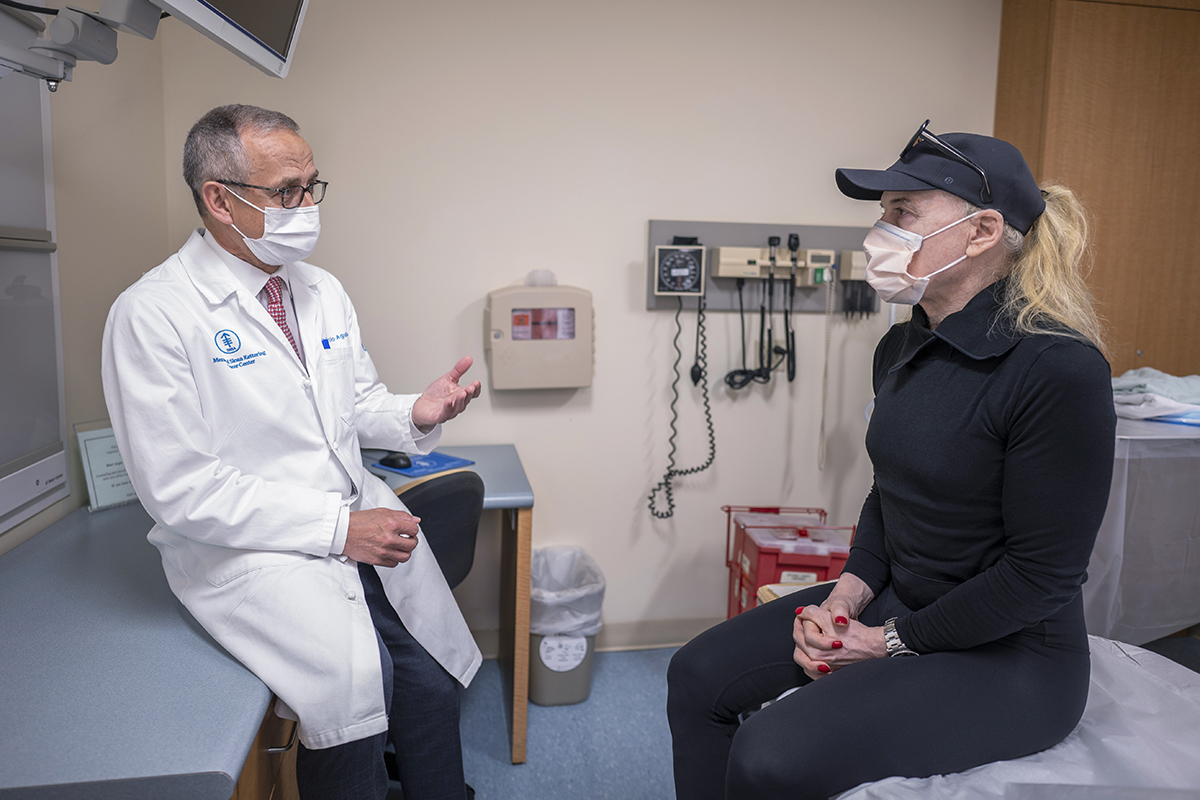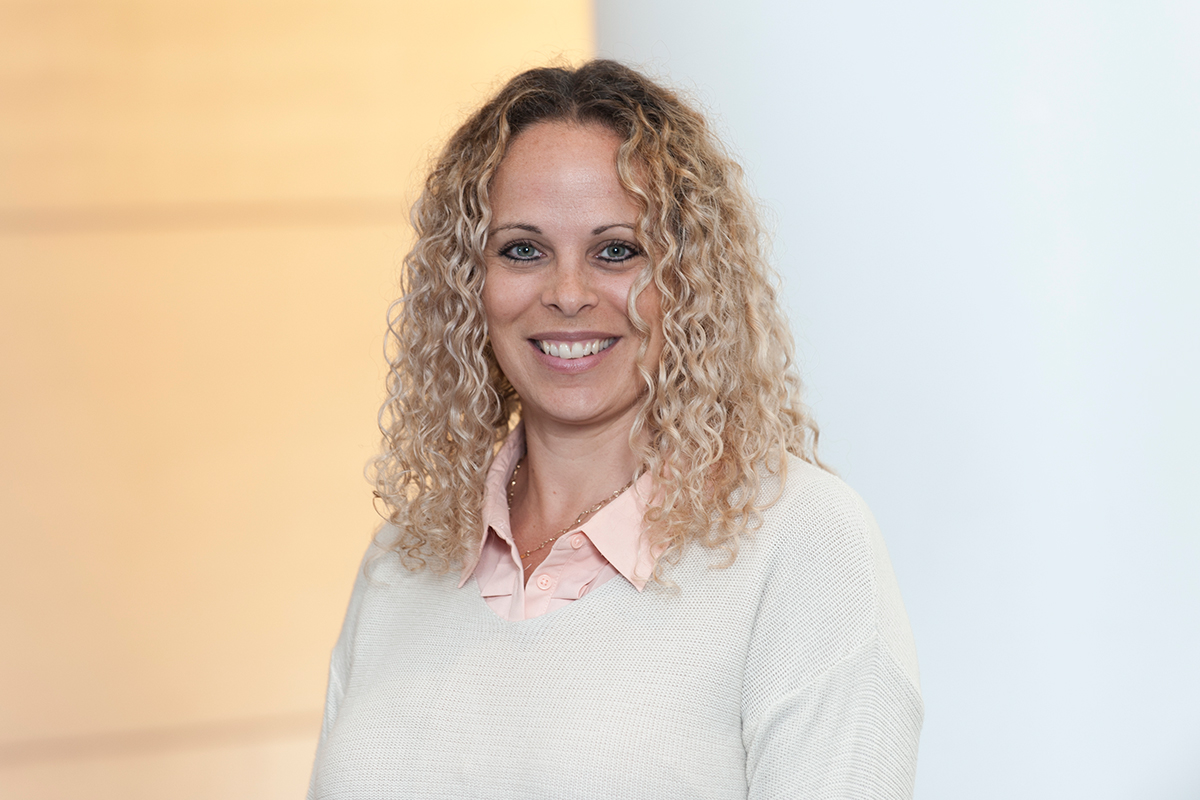
Susan Everson, a transgender woman, was treated at MSK for stage 3 colorectal cancer. She says not only did her care team offer the most advanced therapies, but they also made her feel welcome. Susan is now cancer free.
As Susan Everson lay in bed recovering from colorectal cancer surgery at Memorial Sloan Kettering Cancer Center (MSK), a nurse walked into her room with bag of cosmetics and a big dose of compassion. Using her skills as a professionally trained makeup artist, she’d come to help Susan, a transgender woman, feel more like herself. This act of kindness made a world of difference for Susan and her recovery. It inspired her to walk throughout the hospital corridor — a crucial step for patients recovering from surgery. Equally important, it made Susan feel seen.
“It was wonderful,” says Susan. “It felt great, like they understood me.”
Ever since she was a child, Susan says, she’s felt uncomfortable in her body. “Even in kindergarten, I remember being with girls on the playground and hoping I could fit in with them,” she recalls. “I would ask God, ‘Please make me a girl!’ ”

Dr. Julio Garcia-Aguilar removed Susan’s colorectal tumor. They developed a strong relationship.
Susan, now 65, has been married twice and for much of her life has endured disdain, bullying, and even violence. When she was serving in the U.S. Navy, she was beaten badly. Even recently at a yoga class on the Upper West Side of Manhattan, an instructor made disparaging remarks directed at her about an upcoming retreat for women only.
“It was horrible,” she says.
Being Diagnosed With Colorectal Cancer
Five years ago, Susan experienced rectal bleeding while riding her bike. She was frightened and worried about how she would be treated by healthcare providers who might focus on her anatomy above all else. Susan had not seen many doctors; she had always been healthy. A rehabilitative yoga instructor, she never drank or smoked. “The last thing I expected was cancer,” she says.
After a colonoscopy revealed stage 3 colorectal cancer, someone at the clinic suggested she go to MSK.
“When I walked into MSK, I was scared about my cancer. I wanted to be alive. But I also want to be accepted,” Susan says.
She braced herself for potentially awkward encounters and confusion over her medical records and the sound of her voice. Susan has not changed her name or gender legally, because the process is quite complicated. Her voice remains low, because she has not taken hormones.
How MSK Helps Transgender People With Cancer Feel Welcome
As Susan began the process of becoming a patient at MSK, it was a relief to see medical forms that explicitly ask patients for both their gender identity and their sex assigned birth, as well as their pronouns and chosen name. Here are some more ways MSK welcomes people of all genders:
- Leaders are focused on efforts to improve caring for the needs of transgender patients. Chasity Burrows Walters, PhD, is Vice President of Educational, Clinical, and Patient Communication. She is also the Executive Sponsor of MSK’s Clinical Advisory Council, which includes patient representatives.
- Our LGBTQI+ Cancer Care Program focuses on the health of lesbian, gay, bisexual, transgender, queer, and intersex (LGBTQI+) people with cancer.
- MSK has been recognized by the Human Rights Campaign Foundation as an LGBTQ+ Healthcare Equality Leader.
- MSK offers connections to groups that help transgender patients through cancer treatment and beyond.
- MSK employs transgender people in a variety of roles.

Dr. Haviland, a nurse practitioner and leader of the LGBTQ Clinical Advisory Committee, welcomed Susan when she came to MSK.
Kelly Haviland, PhD, a nurse practitioner and Co-Chair of the LGBTQ Clinical Advisory Committee, welcomed Susan when she came to MSK. “I was immediately struck by how open she was,“ says Dr. Haviland. “She shared one horrific story after another about mistreatment not only by medical providers but also by many people throughout her life. As a veteran, she served and protected our nation, but we did not show her the same protection. My hope is that every patient that comes through our institution feels warmth and compassion.”
Susan says she senses that the people who work at MSK have been educated on transgender healthcare issues.
“They treat you with the utmost respect, and they’re trying to get even better,” says Susan. “They’re friendly, remember your name, and when there’s a mistake, they correct it. Not only have they made me comfortable by calling me ‘Miss’ and by my chosen name, but they’ve also asked me directly, as a trans person, whether I feel welcome.”
Cancer Care for Trans Patients
Susan’s care team included colorectal cancer surgeon Julio Garcia-Aquilar, MD, PhD, and radiation oncologist Paul Romesser, MD.
“Susan is an amazing and strong woman,” says Dr. Romesser, who instructed all of his staff to make her feel welcome. “Walking in and addressing Susan by her name and using female pronouns from the beginning really helped solidify the strength and trust of our therapeutic relationship.”
Susan was the very first person in the world to be treated in a phase 1 clinical trial (research study) evaluating a new radiation sensitizer (peposertib) to enhance radiation’s effectiveness in killing tumor cells. Susan then received chemotherapy (FOLFOX) to further shrink the tumor. Dr. Garcia-Aquilar removed the tumor, and Susan has been cancer free for nearly 5 years.
She is now considering taking hormones so that she may undergo facial feminization surgery.
“Dr. Garcia-Aguilar is the person who encouraged me to have it done and told me it would make me happier,” says Susan, who was touched by his concern for her.
Although Susan is worried the hormones might somehow restart the cancer, Dr. Garcia-Aguilar has been reassuring.
“From an oncology perspective, using hormones for facial feminization is safe,” he says. “There is no evidence that estrogen will have a negative impact on someone 5 years after completing treatment. And it could improve Susan’s quality of life.”
It’s important to note that colorectal cancers are generally not driven by hormones. Transgender patients with hormone-sensitive cancers like prostate or breast may receive different guidance from their oncologists.
Unfortunately, many transgender people do not receive equitable healthcare. A recent Washington Post survey of transgender adults found nearly half say the healthcare providers they have dealt with know “not too much” or “nothing at all” about providing healthcare to transgender people.
At MSK, researchers are focused on managing the special needs of these patients. Genetic counselor Megha Ranganathan, MS, CGC, recently spoke at a national conference of oncologists about caring for transgender patients with inherited mutations in the BRCA1 and BRCA2 genes. Mutations in these genes can increase the risk for several cancers, including breast, ovarian, and prostate cancer.
“Understanding the nuances of cancer risk management in transgender individuals with a hereditary predisposition for cancer is important,” says Dr. Ranganathan, “because it helps provide personalized care in the context of their gender-affirming treatment.”
Susan is sharing her story in hopes of raising public awareness and empathy. “I understand if people may be confused by my voice and use the wrong pronoun at first,” she says. “But hopefully one day everyone will understand there are different aspects of gender identity and different ways to be a woman. I was just born in the wrong body.”


